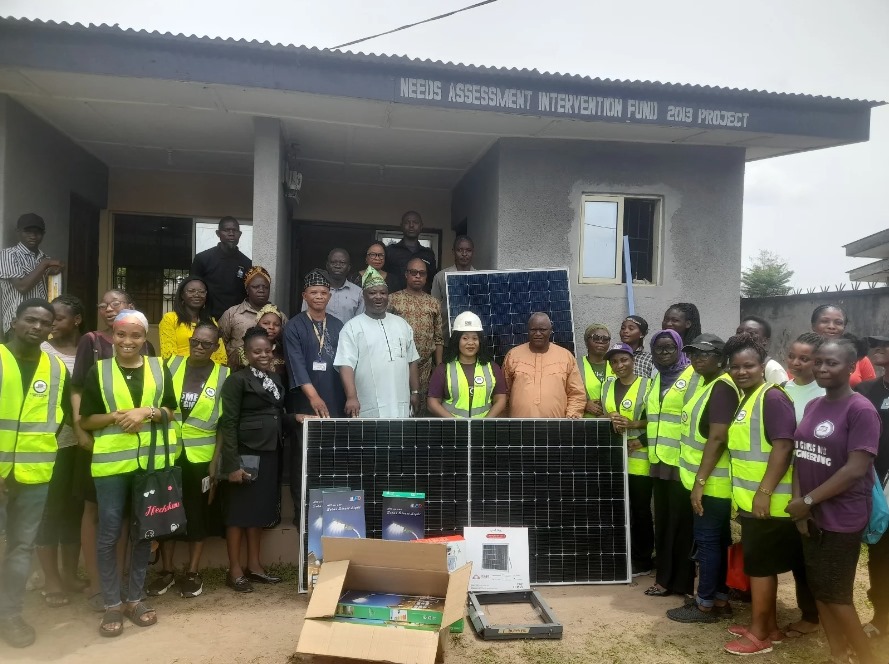
As part of its Corporate Social Responsibility, the Women Engineers also donated a 1.5hp solar pump and five solar street lights, to address the challenge of erratic electricity power supply in the campus.
During the donation at the university campus, the Chairman, APWEN Lagos Chapter, Atinuke Owolabi, said that the association spent not less than N5 million to purchase the equipment for the electrification of the hostel.
Owolabi said the installation would enable students to have a 24-hour constant power supply.
She described the blackout in Epe environs and by extension, the school campus, as a pathetic situation.
She said the situation became an issue of concern to the association when it received reports of the harsh conditions the students were coping with due to a power outage on the campus for over a month.
Owolabi said this also affected the water supply because there was little or no means to pump water and that posed a threat to the security of the lives of students as a result of the blackout.
The chairman said enhancing the learning environment would encourage female engineering students to excel in their academics.
According to her, this is a priority for APWEN, hence the mission to ameliorate their plight by providing the solar system as soon as possible.
Owolabi said, “We believe that this electricity provision for our female engineering students would create a conducive learning environment, encourage uninterrupted study sessions and make them more resourceful.
“The power supply will help our female engineering students when doing their research, especially the 500-level students. They will be able to power their phones, laptops, and other gadgets and do their assignments.
“APWEN is on a mission to equip the female engineering students and build their capacities. They deserve the best because they are the future of our country.
“With the solar pump, they will also have access to potable water and proper sanitation of their environment.
“We want our Faculties of Engineering across universities to produce more of first-class graduates. We are ready to support and also remove any hindrances to that goal.”
Speaking further, the chairman said four of the street lights would be installed in strategic areas in the female hostel for illumination, while one of them would be installed in the male hostel, to also support them.
She added that the women engineers believe in development, therefore giving support to the students from the Faculty of Engineering and Electricity.
Owolabi explained that mere words were not enough to motivate female students into the engineering profession by equipping them through such CSRs, training and mentorship.
She stated that the female students will also be trained on solar generation, installation and maintenance to promote renewable energy and reduce carbon footprint in the campus.
She stated that APWEN would continue to support female engineering students in all institutions across the state, address their peculiar challenges and focus on how it affects one institution to the other.
Owolabi revealed that APWEN had also engaged the Lagos State Commissioner for Energy and Mineral Resources on the plight of the students on the campus.
She hinted on the plan by the state government to launch an emergency intervention of a mini-grid for the university campus.
The chairman said that the association would follow up with the engagement to ensure that the promise was delivered.
She, however, called on NGOs, corporate organisations, engineers and other philanthropists to support the initiative, saying, “The government can not do everything alone”.
Owolabi charged the LASU Epe management and the female students to maintain the equipment so that it could serve them for years.
Commenting, LASU Epe, Head of Campus, Prof. Elkanah Oyetunji, on behalf of the university’s Vice-Chancellor, Prof. Ibiyemi Olatunji-Bello, appreciated APWEN for the donation.
Oyetunji said the association’s gesture would complement the university management’s effort to create solar-powered resource centres to make life better for the students.
“The university management has been powering the campus over the years on diesel for about seven to nine hours daily because the electricity supply in Epe is very erratic.
“However, the expenses incurred by running diesel generation are no longer sustainable and in view of the unstable electricity supply within the Epe environment.
“What we do now is to switch on the generator set for about two hours daily, to power the pumping machine in order to have water.
“Part of our efforts to also make life better and easier for the students, create a resource centre that will be solar powered, to enable our students to study, charge their electronic devices and read all through the night.
“This gesture is good and will complement our efforts,” he said.
Oyetunji sought more support from APWEN for the university campus in whatever capacity, while advising the students to make the best use of the equipment.
The HoC urged other sister associations and corporate organisations to emulate APWEN, by collaborating and supporting the university.
Responding, a LASU Coordinator, APWEN and 500-level Mechanical Engineering student of the university, Ms Rebecca Kehinde, appreciated APWEN for the donation and assistance in addressing a major challenge of the students.
Kehinde, also the best undergraduate student of the Engineering Department of the university, stated that the last few weeks on the campus had been challenging due to the erratic power supply.
She noted that the installation of the solar system, solar pump and street light had brought hope and smiles back to the faces of the students.
“We are so excited about this gesture and believe that more development will follow. We are grateful to APWEN for facilitating this and the university management for the support,” she said.
APWEN was established in 1982 as a division of the Nigerian Society of Engineers by Nigerian Engineer, Joana Maduka.
The association, which had six women at inception, now has a membership of over 3,000, with chapters in 35 cities, and collegiate in 16 campuses in all six geopolitical zones of Nigeria
It advocates the inclusion of females in the engineering sector by educating them to contribute to the production sector of the economy.
NAN





